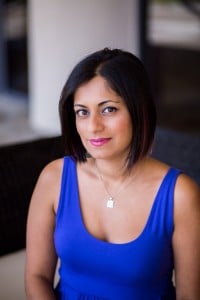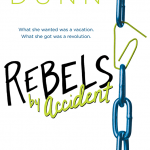It wasn’t the first time I had heard a woman give the azaan. In our Ramadan prayers in small activist circles with radical and queer Muslims, my friend Naaz would call us to prayer, her soft voice resonating through our small apartments. Her words were confident but her voice unpracticed and raw. Where else could a woman be allowed to practice the call to prayer? It felt rebellious.
But this time it was different. We were in the big hall of a vaulted multifaith center, wooden pews moved to the side along the wall, a huge, unused brass organ dominating the stage. Large sheets were spread over the carpet and women of all ages, ethnicities and races – some wearing headscarves, some not – were sitting on the floor.
The muezzina walked up to the stage, pulling her scarf over her copper curls. With one hand on the microphone at the podium, and one hand to her ear, she recited the call to prayer. With her face turning to one side and then the other, voice booming up to the rafters, she was both strong and feminine. There might not be a minaret, but her eager voice, full of joy, was weaving holiness over us.
My eyes welled with tears instantaneously.
There was an unexplainable beauty hearing this woman call us to the first Jummah at the newly established Women’s Mosque of America. It didn’t feel defiant sitting in that second row listening to a woman’s voice calling us for prayer. In this space a woman’s azaan didn’t exist in spite of men, but because of us as women. In this mosque, we were welcome to come as we were, to become all that we yearned to be.
The muezzina had paid her own way from the East Coast to join us for Friday prayers. As a child she had walked around her home calling the azaan, dreaming of doing so in public. Her family had scoffed, telling her that women couldn’t perform the call to prayer. She told herself that if she couldn’t, she would raise her two sons to be able to do so. But, in this safe and sacred women’s space, her dream was finally realized.
I couldn’t get over her story as I listened to her “Allahu Akbars” vibrating through the air. Through my tears, all I could think about was how desperately I missed Ammu and how I wish she could have been there to have finally witnessed this.
+++
Do you ever feel like a life can leave imprints long after people are gone? Because I swear, every time I pass by the corner of Ammu’s room where her jainamaz used to be, the energy from her prayers still resides there. It shimmers. It hurts to look at. So every time I walk by the room, I close the door slightly so that I don’t have to look at that corner in the empty room.
+++
“Go back to the bathroom and do it again!” the huzur yelled at me. I had already completed wudu twice, but it wasn’t to his liking. “Your elbows aren’t wet enough. Go back!”
I was in tears. My chin jutted out in defiance. I hated being yelled at.
In my Nana’s bamboo furniture-filled living room in Bangladesh, the adults had scheduled this Qur’an teacher with his scraggly beard, white kurta and cotton thupee to come by for my religious education. I was eleven and, apparently, already late in learning Arabic. This three monthlong summer “vacation” in Bangladesh was when I was supposed to learn.
It wasn’t that my parents hadn’t tried to teach me Arabic – but we moved around a lot in smalltown America when I was a kid, and I never got past learning the Alif, Bey, Thehs. I had been raised in “strip mall” mosques, where engineer uncles doubled as Sunday morning Qur’an teachers and no one could answer any of the “why” questions I had.
This huzur was no better – and maybe even worse. They had found him at the local mosque and he only had a basic understanding of English, which paired ill with my basic understanding of Bangla. He was mean to me, perturbed perhaps by teaching an “entitled American girl”, but as soon as my Nana or Nani walked in, he was as “Haan, ji…!” polite as could be.
I went back to the bathroom for a third time to do wudu. But, I decided to quit right then and there. I refused to go back to the living room and went crying to my Mom instead.
“This is how they teach here,” my Mom tried to soothe me, as if rudeness could be explained away as “culture.”
The adults had a talk with him. He came back once more after that, but I boycotted him vehemently. And I never took another Arabic lesson again.
+++
“Maybe now I can learn to love namaz,” my friend S. said later that evening after the Women’s Mosque Jummah.
We were at an art show and I had been gushing to her about how amazing the prayer had been. It had been inclusive, diverse, and non-judgmental. There had been no policing of women’s bodies, clothes or how they prayed. Everyone had been accepted as they were.
“Next time, we should go together,” I said.
“You know,” she hesitated, looking at me intently, “I don’t really know how to pray… I never really learned. I wouldn’t know what to do.”
I looked straight back into her eyes. “I can’t imagine a more inclusive and non-judgmental place to learn. Come.”
+++
My first memory of praying is sitting on the floor on top of Ammu’s shiny blue jainamaz. I used to draw shapes on the rug, mesmerized by how the carpet retained my finger’s tracings. I was little, maybe four years old. She’d make me pray with her every time it was Maghrib.
In our house, we never prayed behind my dad. Ammu would pray by herself and she’d have me follow along next to her. I would stand when she stood, cupping my hands when she did, bowing as she bowed. I’d see her lips move as she recited words and wondered why I couldn’t hear what she was saying. When she was done praying, she’d pull out her favorite thosbee from her youth and start clicking them between her fingers.
That was all. That was how we prayed for most of the formative years of my life. Side by side.
When she died, I couldn’t understand why I couldn’t pray next to her. I didn’t understand why my sisters and I had to pray separated on the second floor, divided behind a glass wall while her body was placed in front of the men’s section for her janaza.
I didn’t understand why they wouldn’t allow her daughters to pray over her as the men lowered her into the ground.
I didn’t understand why even in the house-turned-mosque we held prayers at the next day, women were segregated into another room.
I didn’t understand why the prayers of the women who loved my pious, strong-willed mother most – her daughters, her sister, her niece, her friends – were best accepted from the dingy, back bedroom.
Throughout it all, I clutched her thosbee, which was wrapped around my right wrist, and I fought. Every time during that grieving process that I could take a stand, I did. I wrote about how I fought against the patriarchy in my Mother’s death here. I wasn’t doing it to challenge Islamic jurisprudence, or take an “innovative feminist stance.” I was doing it because my mother had fucking died. And I wanted to pray for her in a way that would honor her as a woman.
That’s the beauty of Islam – at its core, it can really be as simple as that.
+++
“There is baraka in the act of struggling,” our khatiba Edina Lekovic said from the podium as she addressed the female congregants crowd during the Friday sermon. Baraka, the flowing force of Allah’s blessings.
I’ve been thinking a lot about how I’ve been struggling – as a woman, as a Muslim, as an un-partnered person. Writing and sharing narratives of my personal journey is something that I’ve been doing for the better part of my adult life.
With the launch of my latest project, a monthly podcast called #GoodMuslimBadMuslim with Love Inshallah contributor Zahra Noorbakhsh, I seem to have stirred the dogmatic pot once again. All of a sudden some people seem compelled to pass judgments that my co-host and I are not really Muslim or “Muslim enough” because we don’t meet their checklist of requirements.
The ironic thing is that whole point of the podcast is to discuss, with levity, these contradictions that we as Muslimah-Americans exist in. Every Muslim woman can be considered both the good Muslim or the bad Muslim – depending on whose perspective you choose to listen to.
I can’t understand the form of Islam that leads people to openly judge my relationship with Allah. It’s these kinds of Muslims who make mosques unsafe spaces for anyone who identifies as a woman, queer, or different.
Being Muslim is the default. We’re all born Muslim and are brought into this world with Allah’s noor. Being Muslim is as simple as believing in Allah. But becoming Muslim? The perfection of internal and external practices is a lifelong journey.
Sitting in the safe, healing space created by the Women’s Mosque of America was incredibly emotional, because for so long I felt like mosques where I could bring my whole self simply didn’t exist. I know this was the same for many of the women I prayed shoulder-to-shoulder with on Friday. Listening to the khutbah surrounded by sisters in the struggle, sisters I had seen through my involvement in social justice in local communities, I felt validated.
We are building in community, we are fighting against social injustices, and we are voicing counternarratives. This women-created and women-led space of spirituality is exactly what I have been seeking to nurture my soul.
I only wish Mom could have been here to see it. I know in my heart that it’s a space she could have used to nurture her soul, too. I know she needed to feel this, too.
—
Read more columns by Taz, here.
Check out Taz’s 2015 set of MuslimVDay cards here and her monthly #GoodMuslimBadMuslim podcast here.
Tanzila “Taz” Ahmed is an activist, storyteller, and politico based in Los Angeles currently working as the Voter Engagement Manager at Asian Americans Advancing Justice – Los Angeles. She was a long-time writer for Sepia Mutiny, and was published in the anthology Love, Inshallah: The Secret Love Lives of American Muslim Women and both zines from Totally Radical Muslims. Her personal projects include curating images for Mutinous Mind State and writing about Desi music at Mishthi Music where she co-produced Beats for Bangladesh: A Benefit Album in Solidarity with the Garment Workers of Rana Plaza. Taz also organizes with Bay Area Solidarity Summer and South Asians for Justice – Los Angeles. You can find her rant at @tazzystar.













